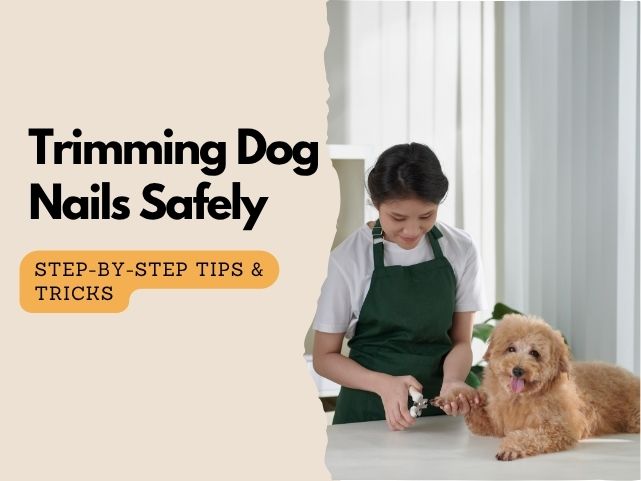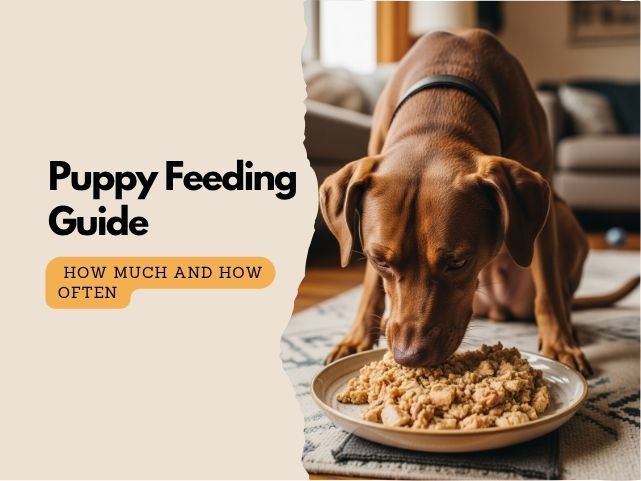At Soluky Pet, we understand that your dog’s behavior can be both endearing and sometimes concerning. One habit that often puzzles pet parents is excessive paw licking. While occasional licking is perfectly normal, persistent or obsessive licking may point to an underlying issue.
Below, we explore the top five reasons dogs lick their paws, along with detailed explanations, symptoms to watch for, and practical solutions.
1. Allergies: Environmental or Food-Related
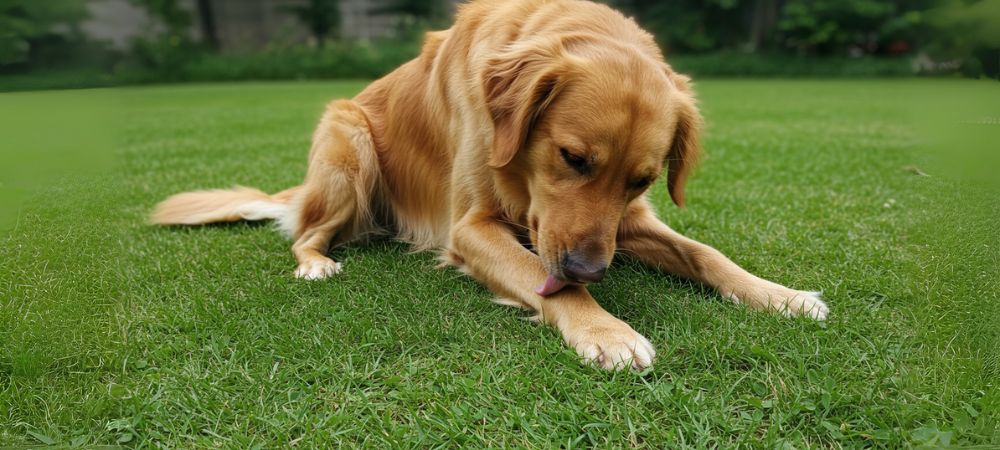
Just like humans, dogs can suffer from allergies that cause itching, especially in the paws. The two most common types are:
- Environmental Allergies (Atopy): Triggers like pollen, grass, mold, dust mites, or cleaning chemicals.
- Food Allergies:Certain proteins in dog food, like beef, chicken, or wheat, may trigger reactions. If your pup licks their paws after meals, a diet change could help.
Symptoms to Watch For:
- Red or inflamed skin between the toes
- Excessive licking after walks or meals
- Brown stains from saliva (especially visible on white fur)
- Itching or chewing on other body parts (ears, belly)
What You Can Do:
- Wipe your dog’s paws with a damp cloth after walks
- Switch to a fresh dog food formula with limited ingredients (consult your vet first)
- Use anti-itch sprays or soothing shampoos. Talk to your vet about allergy testing if symptoms persist
2. Pain or Injury: Hidden Discomfort
Dogs may focus on licking one paw if it’s injured or causing pain. Common culprits include:
- Cuts, insect stings, or thorns
- Cracked paw pads or broken nails
- Arthritis or joint discomfort
- Foreign objects (e.g., foxtails) stuck between toes
Symptoms to Watch For:
- Sudden licking of one paw
- Limping or favoring a leg
- Swelling, redness, or visible wounds
- Sensitivity or whining when the paw is touched
What You Can Do:
- Examine the paw carefully for injuries or debris
- Clean small wounds with saline and apply a pet-safe antiseptic
- Visit the vet for serious wounds, swelling, or persistent limping
3. Parasites: Fleas, Ticks, or Mites
Pests often hide in warm areas like paw pads, leading to intense irritation. Common parasites include:
- Fleas and ticks
- Mites (Demodex or Sarcoptes, which cause mange)
- Chiggers (harvest mites found in grassy areas)
Symptoms to Watch For:
- Intense scratching of paws and other areas
- Presence of black specks (“flea dirt”)
- Red, crusty, or flaky skin
- Patches of hair loss around the paws
What You Can Do:
- Avoid toxic topical and oral treatments and use natural preventatives made with essential oils and common household ingredients, like those recommended by Dr. Karen Becker
- Wash your dog’s bedding regularly and vacuum your home
- Check your dog regularly after walks or daycare using a flea comb to catch any fleas or ticks early
4. Anxiety or Boredom: Emotional Triggers
Dogs may lick their paws as a way to self-soothe when feeling stressed, anxious, or bored. Common triggers include:
- Separation anxiety
- Lack of mental stimulation
- Routine changes, such as moving or new pets
Symptoms to Watch For:
- Licking mostly when alone
- Destructive behaviors (chewing furniture, digging)
- Pacing, excessive yawning, or whining
What You Can Do:
- Provide stimulating toys
- Increase daily play and exercise
- Consider calming supplements (e.g., CBD or L-theanine)
- Consult a behaviorist for chronic anxiety or compulsive behaviors
For more ideas on keeping your dog mentally engaged, explore these easy enrichment techniques you can try at home.
5. Infections: Bacterial or Yeast
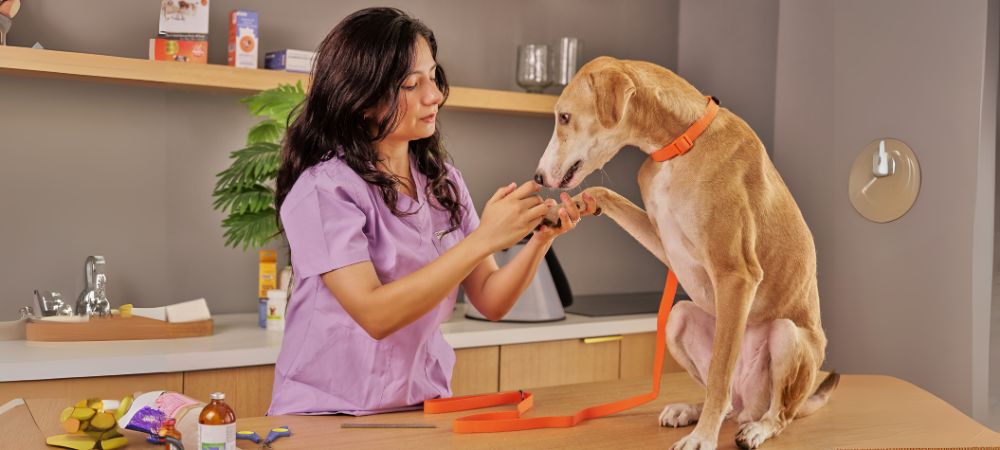
What’s Happening?
Constant licking keeps paws moist, creating an ideal environment for:
- Yeast Infections: Often produce a strong, musty odor and brown discharge
- Bacterial Infections: Can lead to redness, swelling, and pus
Symptoms to Watch For:
- Foul odor (like cheese or corn chips)
- Swollen or red skin between the toes
- Crusty build-up or brownish discharge
- Persistent licking of the same paw
What You Can Do:
- Start with the right diet: feed natural, minimally processed food like Soluky. Avoid kibble and canned food high in carbs, which can fuel yeast
- Keep paws dry after baths and outdoor activities
- Use antifungal or antibacterial shampoos (e.g., Malaseb)
- Visit your vet for prescription treatments if the infection is severe
When to See a Vet?
While some paw licking can be addressed at home, there are times when professional veterinary care is essential. If your dog has open wounds, visible bleeding, or is limping consistently or favoring one leg, these may be signs of a more serious injury or underlying condition that requires immediate attention.
Additionally, if you notice a strong odor, the presence of pus, or swelling around the paw, it could indicate an infection that may worsen without proper treatment. Lastly, if you’ve tried home remedies like cleaning the paw, changing diet, or using calming tools, and see no improvement after several days, it’s time to consult your vet.
Early intervention not only prevents complications but also ensures your dog stays comfortable, healthy, and happy.
Conclusion: Give Your Dog the Comfort They Deserve
At Soluky Pet, we know how much your dog’s well-being means to you. Excessive paw licking can be more than just a quirky habit; it often signals discomfort, stress, or an underlying health issue. Whether it’s allergies, injury, parasites, anxiety, or infection, identifying the cause is the first step toward effective treatment.
Take action today because every paw deserves care, comfort, and love.
FAQs:
Is it normal for dogs to lick their paws occasionally?
Yes, occasional paw licking is normal and usually related to grooming or cleaning after a walk. However, if your dog is licking excessively or obsessively, it could be a sign of an underlying issue like allergies, injury, or anxiety.
How can I tell if my dog’s paw licking is due to allergies?
Watch for symptoms like red or inflamed skin between the toes, licking after meals or walks, and brown staining from saliva. Dogs with allergies may also chew other body parts, like their ears or belly.
Can anxiety really cause a dog to lick its paws?
Absolutely. Dogs may lick their paws to self-soothe during times of stress, especially when left alone or feeling bored. Separation anxiety, changes in routine, or lack of stimulation can all contribute to this behavior.
Should I stop my dog from licking its paws?
If the licking is excessive, try to gently redirect your dog’s behavior while identifying the root cause. Never punish them; instead, consult your vet and consider solutions like calming toys, supplements, or addressing potential medical issues.
What home treatments can I try before visiting a vet?
You can wipe your dog’s paws with a damp cloth after walks, switch to hypoallergenic food, use anti-itch sprays, or apply paw balms. For anxiety, interactive toys or calming treats can help. If symptoms persist beyond a few days, see your vet.
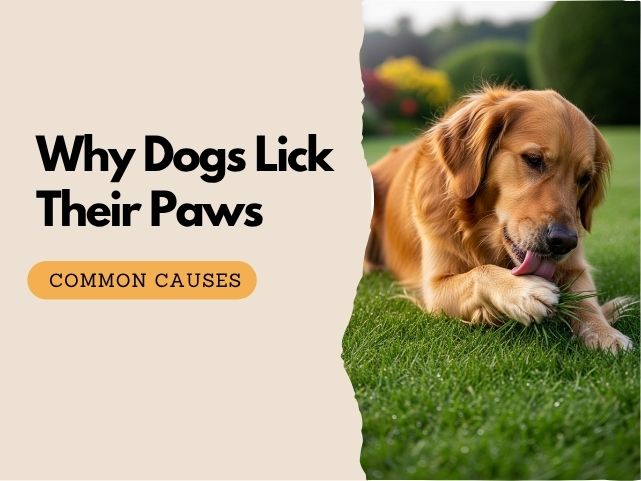
 You Might Also Like
You Might Also Like